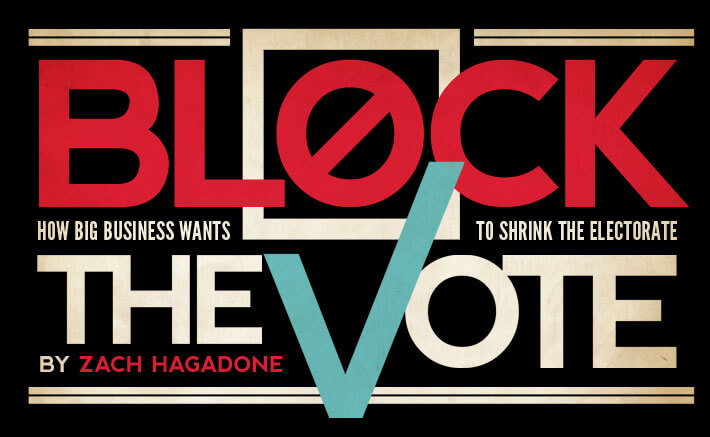SNEAK ATTACK
It doesn’t take much analysis to figure out the upshot of proliferating voter ID requirements: fewer seniors, students, people of color and low-wage earners at the polls. And it doesn’t take much to see who would most benefit from a whiter, more middle age, affluent electorate.
“I don’t think it’s a coincidence that the legislators carrying these bills are not Democrats,” said Lisa Graves, executive director of the nonprofit watchdog group Citizens for Media and Democracy (CMD).
According to Graves, whose organization has made voting rights a priority issue, this newest push to limit the franchise traces its roots to the 1990s and the enactment of the National Voter Registration Act, or “Motor Voter,” under President Bill Clinton. The measure did exactly what its name implies: made it easier for voters to register. African-Americans, particularly, registered in high numbers, Graves said, prompting backlash among conservative states.
“In response to that law Southern states started proposing changes to the laws to make it harder to register. Those bills went nowhere; they were perceived as racist…and sort of languished for a number of years,” she said.
Then came the election of President George W. Bush, “and the right wing started pushing this theme of voter fraud,” Graves said. The Bush administration even tried to redirect the voting rights section of the civil rights division to push this idea of voter fraud, she added.
“U.S. attorneys were fired because they didn’t do enough to assert non-existent voter fraud,” Graves said.
Despite pressure from the new Bush administration, strict voter ID laws remained few and far between, with only Indiana and Georgia enacting restrictive ID measures in 2005. But, Graves said, “these things were bubbling.”
When Barack Obama won the 2008 presidential election, it was in large part due to huge voter turnout in cities and among students and African-Americans. Republicans, having lost the White House, also found their party losing ground in state legislatures. According to data compiled by News21, 62 voter ID bills have been introduced in 37 state legislatures since 2009, with the bulk of the measures introduced or adopted in 2011 and 2012.
According to the Brennan Center and News21, a handful of states have active, strict photo ID laws for voters and more than a dozen others are pending—either hung up in court, awaiting preclearance from the Department of Justice or too recently enacted to be in effect.
“It’s remarkable,” said Jennie Bowser, Denver-based senior fellow with the National Conference of State Legislatures. “I’ve tracked election legislation since late 2000 and everything that happened in Florida, and I’ve never seen so many states take up a single issue in the absence of a federal mandate.”
Graves, meanwhile, fingers the culprit.
“Suddenly the Indiana law was dusted off the shelf and put out there as a national model that every state should be pushing,” she said. “And ALEC is behind it.”
THE BILL MILL
ALEC stands for the American Legislative Exchange Council and, according to some, it is nothing less than a shadow lawmaking body that draws its strength from an ocean of corporate money. If the Supreme Court ruling in Citizens United can be said to have opened the flood gates to corporate cash in American politics, then ALEC is trying to turn on the flood.
“ALEC isn’t simply a think tank or a gathering of lawmakers, it is a corporate-funded operation that pushes a corporate message and a conservative message,” said Graves, of the Center for Media and Democracy, which in July 2011 made public 800 internal documents on its website, AlecExposed.org, proving ALEC’s cloaked hand in crafting “model legislation” meant for introduction in statehouses around the country.
“At its core it is a way to take some of these ideas that a think tank might fancy and operationalize them,” she said. “And I use ‘operationalize’ very purposefully.”
A call to ALEC’s media relations representative for comment on this story went unanswered, but the organization’s ideological bent is clear enough on its website: a “nonpartisan individual membership organization of state legislators which favors federalism and conservative public policy solutions.”
Registered with the Internal Revenue Service as a 501c3 nonprofit, ALEC boasts around 2,000 member legislators—the vast majority being Republicans—who pay a nominal fee for membership, and upwards of 300 corporate and other private-sector members who pony up between $7,000 and $25,000 for the privilege of getting together with sympathetic lawmakers at lavish retreats.
Broken up into task forces focused on various aspects of public policy—from education to law enforcement and the environment—ALEC members, both from the public and private sectors, get together and write model bills which are then voted on and, if ratified, carried home by ALEC legislators for introduction in their respective states.
The strategy has been successful. ALEC brags on its website that each year about 1,000 pieces of ALEC-written or ALEC-inspired model legislation ends up getting introduced in the states, with an average 20 percent becoming law.
Despite this, and even though the organization has been active for nearly 40 years—it was established in 1973 by arch conservative Paul Weyrich, who also started the Heritage Foundation—ALEC has remained largely under the radar. Nonetheless, its impact on policy in the states reads like a greatest hits compilation of the most controversial bills in recent history: from changes to U.S. gun laws like the Florida “stand your ground” legislation made infamous by the Trayvon Martin shooting (a measure that was crafted with help from the National Rifle Association, a prominent ALEC member), to state-based efforts at overturning or circumventing the Affordable Care Act, to recent measures limiting teacher union powers and handing portions of student instruction over to for-profit education companies. Even Arizona’s hotly contested immigration law—SB1070—started life as a ALEC-approved “model” bill.
“There’s a whole set of bills that are advancing that corporate agenda to privatize prisons, privatize education, and by privatize I mean profitize,” said Graves.
PROFIT IS THE NAME OF THE GAME
According to figures from ALEC’s own IRS filings from the past three years, made public by CMD, the organization raked in more than $21.6 million from corporations (with members including Exxon Mobil, Altria, GlaxoSmithKline and Pfizer), foundations like none other than the Charles G. Koch Charitable Foundation and nonprofits including the NRA, Goldwater Institute and Family Research Council. In all, private-sector contributions account for nearly 98 percent of ALEC’s funding, while the dues paid by member lawmakers, pegged at about $50, came to just more than $250,000, or about 1 percent of its haul during the same time period.
In exchange for these hefty—though tax deductible donations—ALEC’s private sector members get to ensure that individual pieces of ALEC legislation, by and large, serve a narrow band of very specific corporate interests: education measures benefit for-profit education firms and harm unions; health care measures benefit insurance companies and drug manufacturers; tort reforms benefit corporations in general by limiting their liability to consumers.
More “insidious,” as Graves put it, is ALEC’s drive against voting rights.
“It’s deeply cynical and quite sinister—an outlandish effort by ALEC and others to make it harder for Americans to vote,” she said. “At the end of the day, depending on which analysis you’re looking at…it’s possible that these measures remove maybe 1 percent from the pool of votes that would be part of the election. You still have an election, but you’ve shaved off this percentage; You have the appearance that you have an election.”
Analysis by News21 found that more than half of the 62 strict ID bills introduced in legislatures since 2009 were based on (or copied from) ALEC’s sample voter ID bill, which was ratified by the group’s membership that same year.
These measures serve no particular business master, rather, they strike at the final weapon the public possesses to stem the tide of corporate-crafted legislation: access to the ballot box.
“The essence of a democracy, and the essence of a representative democracy in the United States, is that we elect people to represent people,” Graves said. “The question is whether our representatives are going to represent us, or if they’re going to represent the interests of global corporations and, in some cases with ALEC, foreign corporations.”
As for why big business would support limiting the franchise, the equation breaks down pretty simply: Corporations want to bring down barriers to doing business, and Republicans are more than happy to oblige. If Republicans don’t win elections, then corporations don’t see those barriers lifted. The solution: Eliminate the competition. If voting rights get in the way, well, like the notorious mob accountant Otto Berman once said, “It’s nothing personal, just business.”
“I think it is a little more class-oriented,” said Alexander Keyssar, professor of history and social policy at the Harvard Kennedy School and a frequent speaker and writer on voting rights issues.
“The core interest in the suppression that’s going on is partisan, it’s not racial,” he said. “If African-Americans voted predominately Republican, or 50/50 Republican, I don’t think their neighborhoods would be targeted for suppressive efforts. I think that it’s a community that now votes 95 percent Democrat and if you want to knock out Democrat interests that’s a good place to start.”
Most important, though, is that suppressing voting rights doesn’t hurt the bottom line.
“You can be a customer who votes or a customer who doesn’t vote,” Keyssar said. “It doesn’t cost them [corporate interests] anything.”
With increasing media scrutiny and public outrage, ALEC’s operations—and specifically its voter ID push—may well hurt both its bottom line and the bottom lines of its corporate members.
In the wake of the Trayvon Martin shooting in Florida earlier this year, nonprofit civil rights group Color of Change leveled criticism directly at ALEC for crafting the “stand your ground” law, and called on its members to urge corporations to drop their support for ALEC. To date, 41 corporate ALEC members have stopped funding the group, including big names like Walmart, Coca Cola, Kraft, Amazon, Johnson & Johnson and General Motors.
Following exposes by CMD, Common Cause, The Nation magazine and others highlighting ALEC’s involvement with voter ID laws, the organization shut down its voting and elections task force, “and I don’t think that happened by accident,” said Spaulding, of Common Cause. “That happened after a sustained spotlight was put on them.”
Losing corporate members and disbanding task forces is one thing, but ALEC may have an even bigger problem on its hands. Common Cause in April filed a whistleblower complaint with the IRS alleging that ALEC’s lobbying activities make it ineligible for 501c3 status. Based on 4,000 pages of internal ALEC documents—some obtained through public records requests and others from inside sources—Common Cause maintains that, “the evidence shows ALEC has an agenda, that they track where their model bills are introduced, that they send out ‘issue alerts,’ which include updates that go to state legislators where ALEC bills or ALEC-related bills are being introduced, sometimes targeting committees or task force members and including talking points, press releases,” said Nick Surgey, Madison, Wisc.-based general counsel for Common Cause.
“It’s remarkable. Essentially ALEC says that they do not lobby. They are a 501c3, which means that they’re a charity, and as a charity they’re able to do some lobbying but it’s limited and you have to disclose it,” Surgey said.
“We have 990s going back many years for ALEC and consistently they tell the IRS that nothing they do is lobbying. They put a zero or they don’t check the box that says, ‘Do you do any lobbying, yes or no?’…They’re clearly trying to influence legislation.”
If the IRS agrees, and ALEC is found to be in breach of the rules, the organization would have to reincorporate as a 501c4 and fully report its activities as lobbying. What’s more, Surgey said there’s the possibility that if ALEC is found to have improperly reported to the IRS, tax revenue lost when donations were recorded as tax deductible may be recouped from individual donors—an action that Common Cause included in its complaint.
“It’s unlikely that the IRS would go after individual donors, but there’s nothing statutorily to say they cannot do that,” Surgey said. “They’d have to make a judgment that donors should have been aware.… Most of the responsibility is on ALEC, but we also believe the corporations should have been aware that ALEC was doing what they were doing, and that’s lobbying.… We believe that they have some liability.”
The whistleblower complaint is still working its way through the system, and Surgey said that these kinds of cases tend to take “quite awhile.” Still, he and others, like Graves at the Center for Media and Democracy, maintain that keeping pressure on ALEC is important for more reasons than just recouping tax revenue.
“It’s also about making sure that these really important, fundamental debates happen in the open,” Surgey said. “We got into looking at ALEC out of a concern that corporations have too powerful a role in our political system;
They have a disproportionate power in the legislatures for a variety of reasons, and ALEC really seems to be the epitome of that.”



































